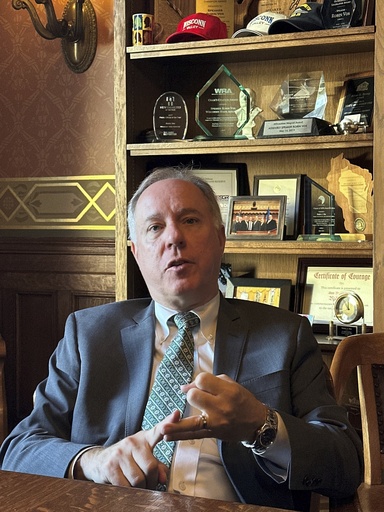
MADISON, Wis. — As the Wisconsin Legislature gears up for its January session, Republicans will continue to hold power but with the slimmest majorities they have had since taking the reins back in 2011. This shift has injected a sense of hope among Democrats, including Governor Tony Evers, who believe this could lead to a more collaborative working environment than in recent years.
The state’s substantial budget surplus, exceeding $4 billion, will be a focal point for discussions over the next two-year budget to be developed in 2025. Alongside this financial dilemma, considerations linger regarding Evers’ potential candidacy for a third term in 2026 and the implications of President-elect Trump’s administration on state affairs.
**New Legislative Landscape**
In the November elections, Democrats gained seats due to new district maps enforced by the Wisconsin Supreme Court. The current breakdown has Republicans holding a 54-45 majority in the Assembly and 18-15 in the Senate. The Democrats now boast 10 more seats in the Assembly compared to the last session and four additional seats in the Senate, igniting hopes of gaining an overall majority in the 2026 elections.
“The changes in the Capitol are already noticeable due to the updated maps,” expressed Assembly Democratic Minority Leader Greta Neubauer. She, alongside other party members, anticipates that the implications of these developments may compel moderate Republicans in tight districts to lean more toward compromise.
“It is clear to everyone that collaboration is essential moving forward. We need to find common ground,” remarked Republican Senate Majority Leader Devin LeMahieu. “Getting things done is our priority.”
**Countering Trump’s Policies**
Discussions among Democrats and key figures, including Evers and Attorney General Josh Kaul, revolve around strategies to counter the Trump administration’s proposed mass deportations while also addressing other contentious issues like abortion and LGBTQ+ rights. “The potential actions from former and future President Trump are concerning, particularly with immigration and deportation policies,” stated Senate Democratic Minority Leader Dianne Hesselbein.
In contrast, Republican Assembly Speaker Robin Vos has aligned himself with Trump’s stance on aggressively seeking deportation of individuals who are illegally residing in the country and may have committed crimes.
**Tax Cut Priorities**
The July 2021 budget showcased a Republican-pushed tax cut valued at $3.5 billion, which Governor Evers limited to $175 million through a veto. With the new budget surplus, Republicans are eager to revisit tax reductions. “People are struggling financially, and they voiced that concern in our local races. We have the resources to assist families, and that will be our top priority,” asserted LeMahieu, who, along with Vos, advocates for a tax cut of approximately $2 billion.
Democrats agree on the necessity for tax cuts but highlight the importance of targeting relief toward middle and working-class families. “We oppose tax reductions that solely favor wealthy Wisconsinites and corporations. However, we are certainly supportive of cuts that support those in financial distress,” Neubauer emphasized.
**Funding for K-12 Education**
In the realm of education, State Superintendent Jill Underly has proposed a budget of over $4 billion dedicated to K-12 schooling, a notion that likely faces pushback from both sides of the aisle. “I assure you we will not allocate $4 billion toward education,” LeMahieu stated firmly. While Democrats prioritize education funding, they, too, acknowledge that the $4 billion target may be unrealistic.
**University of Wisconsin Budget Requests**
University of Wisconsin leaders have laid out a request for an additional $855 million in funding, nearly an 11% increase, as they argue it is essential for preventing tuition hikes and maintaining operations amid declining enrollment. Although Evers is inclined to include this funding in his proposal, Republican leaders have indicated disapproval of such a drastic amount alongside the Democrats, declaring it an unlikely goal to achieve. “We need to witness significant reforms in their programming,” noted LeMahieu. “Endless funding without accountability is unsustainable.”
**Other Legislative Goals**
Vos plans to form a state-level task force aimed at enhancing government efficiency, akin to a national initiative previously established by Trump. He also intends to support measures for early absentee ballot processing, a suggestion that has seen bipartisan backing but failed to materialize in past sessions.
Democratic representatives are determined to seek avenues for enhancing costs in child care, ensuring better health care for new mothers, and lowering prescription drug costs. Both parties also share ambitions to further affordable housing initiatives. A critical juncture lies in the fate of the state’s land stewardship program, recently addressed by the state Supreme Court, which ruled against Republican efforts to halt project funding. Additionally, Democrats aim to reinvigorate plans to legalize medical marijuana, a topic that garnered some Republican support but remained unsuccessful during the previous session. LeMahieu expressed skepticism regarding the prospect of marijuana legislation passing given the tighter Republican control. “There are lawmakers who remain firmly opposed,” he stated.

